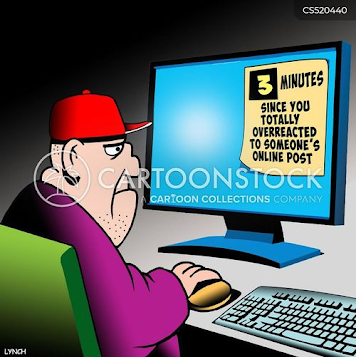With the task of analyzing an online argument, I took to Twitter, knowing that my search would not be long. I use the app frequently, as I have discussed in previous posts, and see arguments daily. Most of these arguments follow the same pattern: they are horrible and accomplish absolutely nothing besides ruining a handful of people's moods. The example I chose to analyze for this post only took me a few minutes to find and reflects the type of things I am used to seeing. I usually find them through a quote retweet, where someone essentially posts on top of the original post with their disagreement for the original. A quote retweet is similar to a reply, but it typically gains more attention, which I think is a large motivating factor for these types of arguments.
 |
| Here is one thread from the post along with a link to the original. |
I chose this post because, as I stated earlier, I see these types of arguments frequently, and I think they represent the perfect example of how not to argue. The argument begins with a baseless and nonsensical claim. Often these types of posts are made just to farm engagement (which can actually make money). However, since the original poster has replied to many of the top comments and does not even have premium, which I believe is required to make money on Twitter, this post likely reflects their actual opinion.
 |
| Most online arguments escalate beyond recovery due to emotional responses (image from CartoonStock) |
The first big issue I have with this argument is that the original claim has no supporting material. The original poster gives no reasons as to why they hold their outlandish belief that lunchboxes are gender specific. The very first reply seen in the image above also contains multiple issues. They give a rebuttal with a generalized statistic which also contains no evidence. If you want to use statistics to prove someone wrong, it must be from a credible source. The replier then follows up their retort with an insult directed towards the original poster, guaranteeing that the argument will not be civil. The following replies show that the argument has shifted from the original topic, indicating that it is now derailed.
There are some basic rules that you can follow when arguing online to prevent arguments from derailing and becoming uncivil. These are partially inspired by the Toulmin method. To learn more about this, check out my previous post. The basic rules are listed here:
- Any claims made should be supported by evidence from credible sources.
- Before responding to someone, take some time to analyze their point of view instead of replying instantly.
- Make your response based on logic and evidence instead of emotion. If you are emotional (usually angry), take some time to become level headed before responding.
- Avoid use of insults and expletives. They contribute nothing to the argument and are likely to derail it.
- Stay focused on the topic of the argument. Do not bring up unnecessary subjects and do not look through the posts of the person you are debating in an effort to use something against them, as this is usually done out of hostility Show whoever you are debating respect.



No comments:
Post a Comment